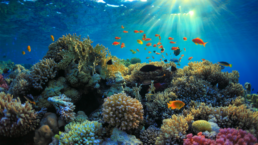Diversity of coral reefs finally uncovered
A portfolio of 9 papers is published today on the TARA project in multiple Springer Nature journals. It is the largest study of its kind on coral reefs. It was made possible thanks to the collection made during the Pacific expedition, with funding from France Genomique, and the Genoscope’s skills in sequencing and bioinformatics.
https://www.nature.com/collections/adgaiffggg
The Tara Pacific Expedition is a multi-discipline project exploring the biodiversity of thousands of coral reefs across the Pacific Ocean – more than 100 scientists from 23 institutes across eight countries have contributed. The schooner Tara set out on a two- and half-year voyage to collect samples from more than thirty island systems.

The diversity of the Pacific coral reef microbiome may approach the current estimated total microorganism diversity on Earth according to new research. The findings, published in Nature Communications and using data collected by the Tara Pacific Expedition during its more than two-year voyage, represent the largest investigation of coral reef microbiome diversity to date, and suggest that the global number of microorganisms may have been significantly underestimated.
Pierre Galand and colleagues (https://www.nature.com/articles/s41467-023-38500-x) collected a total of 5,392 samples from three coral species, two fish species, and plankton in 99 different reefs from 32 island systems in the Pacific between 2016 and 2018. These samples were sequenced to determine reef microbiome composition and mapped to record geographic distribution. Overall, plankton showed the greatest microbiome diversity. The authors report that the coral microbiomes did not follow the expected pattern of greater diversity in the western Pacific, which is home to a greater variety of coral species than the eastern Pacific. There was also no significant correlation between seawater temperature and microbiome diversity.
A second paper by Alice Rouan and colleagues (https://www.nature.com/articles/s41467-023-38499-1#Ack1), investigated the relationship between water temperature changes and telomere DNA length (an environmentally-sensitive marker of health and ageing) in two types of reef-building coral. The authors report that seasonal temperature variation affected telomere length in the short-lived and stress-sensitive types of stony coral (Pocillopora), whereas the longer-lived and more robust types of stony coral (Porites) were affected by unusual heatwaves and cold periods rather than seasonal variation. This suggests that the telomeres of some corals may respond differently to the effects of climate change.
Two other papers published in Scientific Data, by Fabien Lombard and colleagues (https://www.nature.com/articles/s41597-022-01757-w) and Caroline Belser and colleagues (https://www.nature.com/articles/s41597-023-02204-0) respectively, describe the Tara Pacific sampling methodology and data generation framework.
Together, these papers provide insights into the health and biodiversity of coral reefs across the Pacific Ocean.

